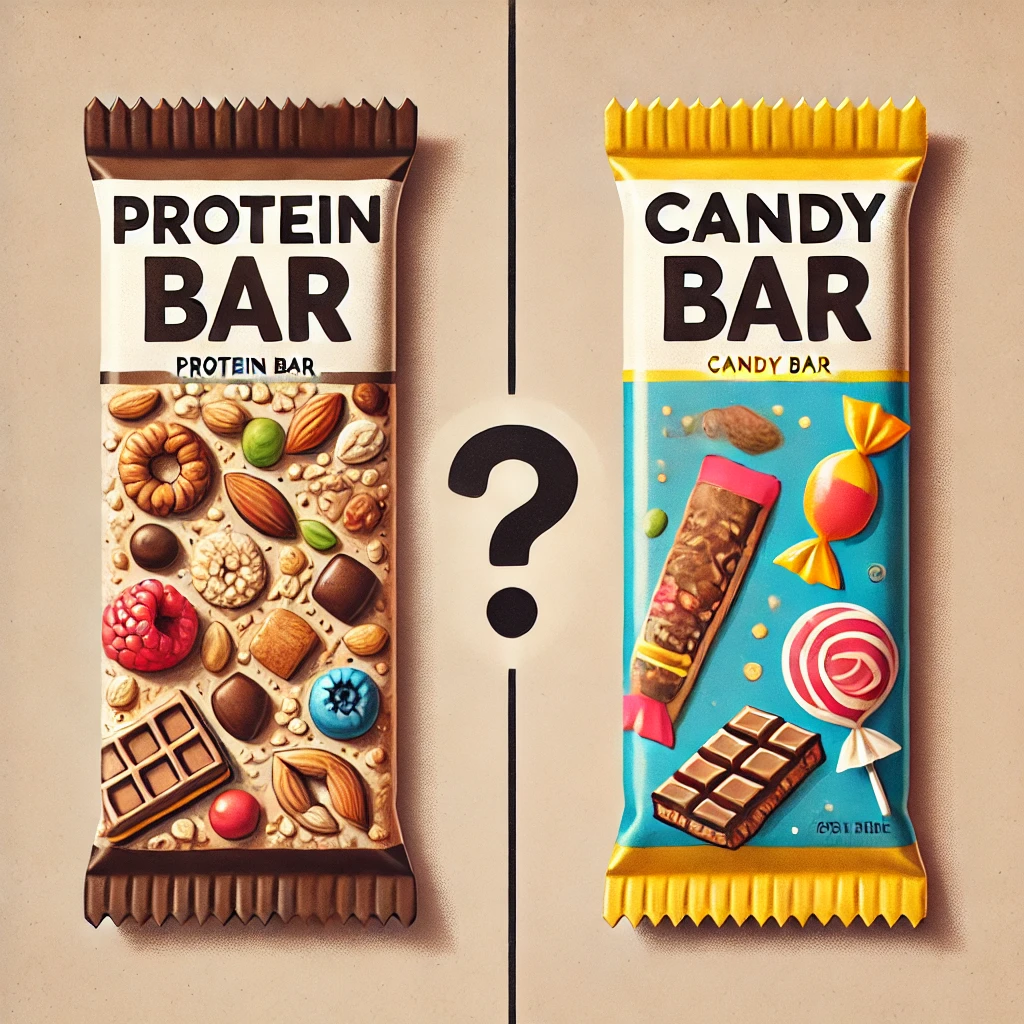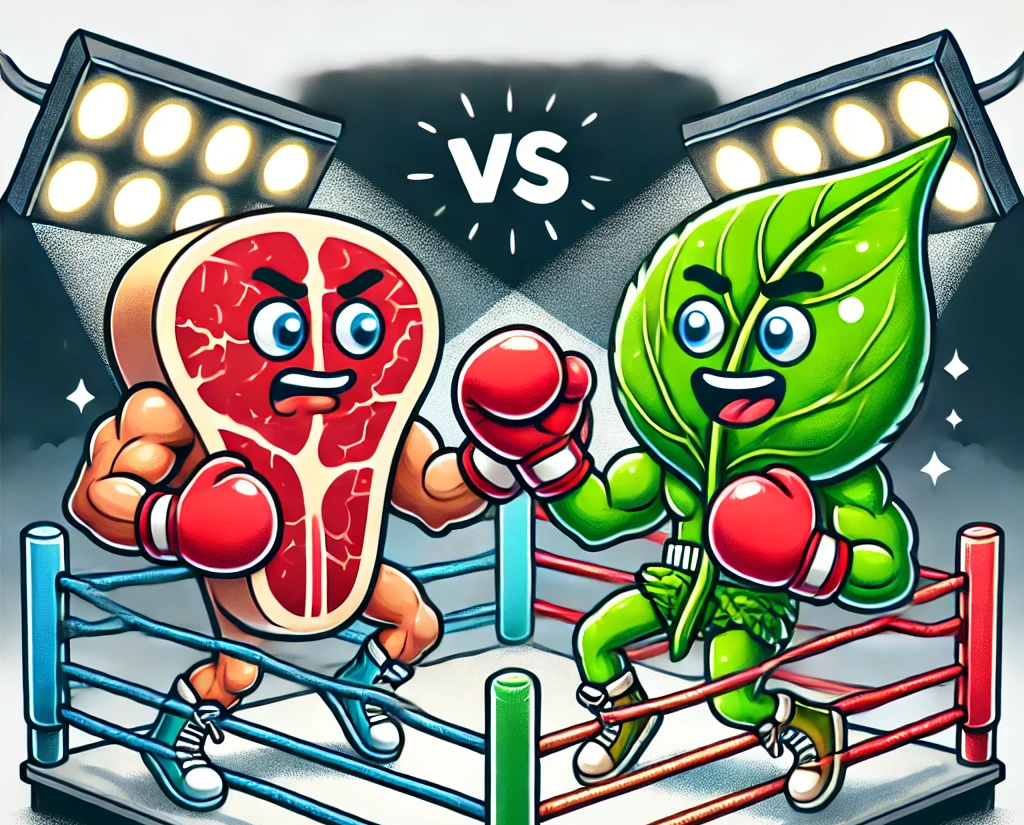A famous youtuber Dr. Eric Berg, has recently made a video that’s going viral entitled ‘Protein Bars are WORSE than Candy Bars’. He then goes into detail about a number of different protein bars pointing out their carbohydrate content, what those carbs are comprised of, and what the ingredients of the various bars are. While I think this is a valuable video, I think there needs to be some more nuance added to the conversation. I’m going to put his video down at the bottom in case you want to watch it before you read the blog as well as link it here.
Main Claim: Protein Bars are WORSE than candy bars
Initial Verdict
No protein bars are not worse than candy bars. I agree with most of the points made in this video, but I think there needs to be a bit more nuance added. The main take away from the beginning of the video is to look at the ratio of carbohydrates to protein if it is in fact called a protein bar. I definitely agree with this point. In fact, I talk to my clients about this with nuts and nut butters. I can’t tell you how many times one of my clients has told me that they think nuts are a good source of protein. I then tell them no; it is a good source of fat. Typically, you’ll only find 3-6 grams of protein with anywhere from 7-18 grams of fat.
So Dr. Berg bringing awareness to the fact that a lot of protein bars have carbohydrates I think is a good thing. Now the questions that need to be answered are ‘is having a protein bar every day bad and are carbohydrates bad?’
Starches are Basically Sugar
Dr. Berg argues that starches, outside of sugar and fiber, are as bad as sugar. However, this oversimplifies the issue. There are different types of starches. All starches are at the end of the day are made out of glucose molecules, but because of the difference in bonding structure, some starches resist digestion, and those foods then make it further through your gut and serve as prebiotic food for your gut bacteria. To bring up the point that starches are made out of glucose, the only reasonable inference there is that he is saying all starches except vegetable starches are bad.
I eat long grain white rice every night. This is a starch and the reason I bring this up is because one of the bars he specifically states the ingredient “rice starches” in one of the bars.
While starches are made up of glucose molecules, they do not breakdown as quickly as sugar does so to compare the 2 is a little disingenuous. Sugar(sucrose) is a Disaccharide made up of 1 glucose and 1 fructose molecule while starches, yes even simple starches like cooked white rice, starch is a polysaccharide made up of long chains of glucose molecules that take a little longer to break down. They are not equal.
Is Sugar Bad?
On to the sugar point. Sugar is not inherently bad. If someone is meeting their prerequisite amount of movement each day and emptying their glycogen stores, the incoming carbohydrates will go towards filling those stores. This is how someone like me and many many others can eat upwards of 300g of carbs a day and not gain a bunch of fat. The carbs are going to our muscles.
I agree with him on the first cliff bar, the builder protein bar, but I’m puzzled by him including the Clif energy bar on there when the title specifically say PROTEIN bars. It has protein in it, but it is not advertised as such. An energy bar is something that people that participate in endurance sports like to use. They’re specifically useful for people that like to go on long duration hikes. The sugar that is in the bar is useful, while it also includes some resistant starches for longer lasting fuel.
Lumping things together
Dr. Berg demonizes starches, but then goes on to list Chicory Root Fiber as an ingredient as if to lump it all in with the bad ingredients he’s listing. Chicory Root Fiber is a semi-soluble plant fiber. Highly resistant to digestion. It’s important to look at the totality of ingredients together and not just infer that something is bad because it has sugar in it. If it has plant fiber as well, you will not see the same spike in blood glucose as if that fiber had not been present and it was just a plain old sugar bar.
When he gets to the kind protein bar, which I’m not a fan of btw due to its abysmally low protein numbers, he mentions glucose syrup as not being low glycemic. The research is pretty clear that independent of individual ingredients, the glycemic load depends on THE ENTIRETY of the whole meal. So if a food or meal has a lot of fiber accompanying that glucose syrup or whatever high glycemic compound you want to choose, it will slow the glycemic response.
Just as an example of this, he brings up The RX bar and says 52.73 percent of it is sugar. As if to say that all the fiber and the starches are just sugars. That’s just not true and you can see from this tiktok users video, that his blood sugar barely spikes and comes down fairly quickly. This is due to the TOTALITY of the meal. He’s not eating the EXACT flavor of bar, but the macronutrient breakdown is very similar. If it were true that the individual ingredients should be the focus, you would expect to see a massive 40-50 point spike accompanied by a fall off a cliff to below baseline like you see from eating typical candy bars.
@insulinresistant1 RXBAR and my blood sugar. How does it affect my glucose levels? #insulinresistance #bloodsugar #glucose #prediabetes #insulinresistant1
♬ original sound – Justin / Stop Spiking Sugar
Protein Quality
I do agree with him on the protein quality points. It’s not a terribly huge difference between soy and whey though. Soy has slightly lower Leucine content which is the main amino acid responsible for muscle protein synthesis, so while it won’t be as good, it’s still not terrible and it will elicit muscle protein synthesis.
Soy protein has slightly slower digestion than something like a whey, so if rapid absorption is something that you’re looking for, which most people typically are when reaching for a protein bar, then a bar with whey would be better.
Sucralose
He brings up sucralose a couple times and this is something that I think is good to talk about. Sucralose is in everything now and it’s basically an artificial sweetener. We need a lot more data, but a recent study found that sucralose can be mutagenic, meaning can encourage gene mutations. If you’re not familiar with this, basically it’s one cause of cancer. Cancer is a mutation due to any number of different reasons. The study is below.
Full article: Toxicological and pharmacokinetic properties of sucralose-6-acetate and its parent sucralose: in vitro screening assays (tandfonline.com)
Bottom Line
Some people have a difficult time increasing their protein numbers at first. Whether from a lack of enjoyment of cooking or a lack of time due to working multiple jobs. Whatever the case may be. These people exist. Reaching for something like a protein bar that has 10-15 grams of sugar along with it, is not going to be the end of the world as long as these people aren’t consuming a bunch of other junk the rest of the day.
If someone is staying physically active, then having a protein bar once a day is a perfectly fine choice. Especially if that 10-15 grams of sugar is the only sugar they’re having in the entire day. To demonize protein bars completely is just silly and its fear mongering and I don’t like it.
If someone’s sugar intake is hindering their weight loss, reducing or cutting back on sugar makes sense. However, I don’t believe sugar alone is driving the obesity epidemic. It’s more about our culture’s lack of emphasis on movement, combined with the consumption of highly palatable, high-glycemic foods that mix salt, sweet, fat, and crunch, keeping people hooked. While some protein bars fit this description, they aren’t as addictive or satisfying as pastries or donuts. Try overeating on RXBars—it’s not the same experience.
There needs to be more nuance in these discussions and I’m hoping to be one of the people to bring it.





1 thought on “Are Protein Bars really WORSE than Candy Bars?”
Very informative and I thoroughly enjoyed this blog.
Comments are closed.